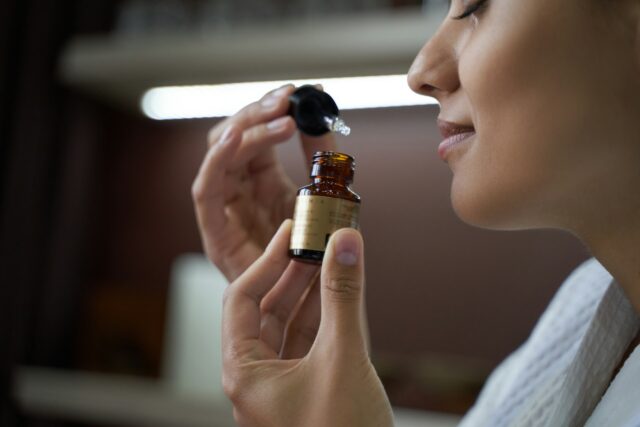Hyposensitivity isn’t talked about as often as hypersensitivity, but it’s just as real—and just as important to understand.

For some autistic people, the issue isn’t being overwhelmed by too much sensory input, but the opposite: not getting enough. Sounds don’t register. Pain might go unnoticed. There’s a craving for sensation that often gets mistaken for hyperactivity, clumsiness, or “being too much.” These signs aren’t always obvious, but they tell a deeper story about how someone experiences the world through a different sensory lens. If any of these sound familiar to you, know that you’re not alone.
1. You seek out strong physical sensations—hard hugs, pressure, or impact.

If you’ve ever felt genuinely soothed by being tightly wrapped in a blanket or pressing your body against something solid, you might be experiencing hyposensitivity. The pressure helps you feel your own body more clearly, especially during stress or overwhelm. It’s not that you like pain; you just need stronger input to feel grounded. Some people even enjoy sports with contact or physical exertion because it gives their nervous system the stimulation it’s looking for.
2. You don’t always notice pain until it gets serious.

Bruises appear without you remembering how they got there. You might realise you’re injured hours, or even days, after the fact. You’ve learned to pay attention not because something hurts, but because it logically should hurt. That muted pain response can be risky, especially when it comes to illness or injury. But it’s not about being “tough” or “unbothered”; it’s just how your brain processes signals from your body.
3. You gravitate toward spicy, crunchy, or super-flavourful foods.

Subtle flavours might leave you bored or dissatisfied. Instead, you’re drawn to bold, extreme tastes—things that tingle, crunch loudly, or come with a kick. Eating isn’t just about nutrition—it’s a way to stimulate your senses. People with oral hyposensitivity often crave textures and temperatures other people avoid. What looks like picky eating on the outside might actually be a deeply sensory experience that makes food more engaging or satisfying.
4. You touch everything without even thinking about it.

Fabrics, surfaces, the edges of objects—your hands are always reaching, tapping, or fidgeting with something. It might look like restlessness, but it’s actually your body wanting feedback from the environment. This can also show up as stimming—rubbing, squeezing, or pressing objects for sensory feedback. It helps you feel more present in your body, especially if your sense of touch is a little under-responsive.
5. You often speak loudly without realising it.

Sometimes people tell you to “lower your voice,” and you didn’t even notice it was loud. Or you find yourself turning up the volume on everything—music, conversations, your own inner voice—because things feel a bit muted. You’re not trying to dominate a space. It’s often just your natural way of matching the level of input you’re trying to receive. If the world feels too quiet, your instinct might be to raise the volume on everything, including yourself.
6. You feel better when you’re moving.

Stillness might make you feel itchy or vague. You need to bounce your leg, rock in your chair, walk around the room, or else you feel disconnected. Physical movement helps regulate your focus and energy levels. That motion-seeking behaviour often gets misread as hyperactivity or distraction. But for someone with proprioceptive hyposensitivity, movement is grounding. It brings the body back into alignment with the mind.
7. You don’t feel hunger or thirst cues clearly.

You forget to eat or drink until you feel dizzy, tired, or sick. You’re not ignoring your needs—your body just doesn’t always send clear signals about them. By the time you realise you’re dehydrated, it’s already pretty severe. This can make self-care tricky. Without clear internal messages, you might need external reminders or routines to help stay in tune with your body’s needs. It’s not laziness—it’s a sensory difference.
8. You enjoy spinning, swinging, or being upside-down.
 Source: Unsplash
Source: Unsplash Roller coasters, hammocks, swings—they’re more than fun. They actually calm or energise you in a way nothing else does. That vestibular stimulation gives your brain a strong enough signal to feel properly “balanced.” This is especially common in kids, but doesn’t always go away with age. It might just show up in more subtle ways—like loving fast car rides or needing to pace while thinking.
9. You tend to bump into things without noticing.

Bruised shins, stubbed toes, or knocking into doorframes aren’t unusual for you. It’s not that you’re clumsy—it’s that your brain doesn’t always register where your body is in space. This is a form of proprioceptive hyposensitivity. Without strong sensory feedback, your movements might lack the precision most people take for granted. You might also grip things too tightly or misjudge distances.
10. You zone out when things are too quiet or uninteresting.

Environments with low stimulation—plain rooms, quiet classrooms, even calm conversations—can make your brain drift. You might fidget, doodle, or daydream to fill in the sensory gap. It’s not a lack of interest—it’s a craving for more input. Your mind may wander when it’s not being fed enough, which is why you look for ways to stay engaged through touch, sound, or motion.
11. You love textured or weighted items.

Rough fabrics, rubbery materials, or weighted blankets bring you a sense of calm or satisfaction. There’s something deeply regulating about strong tactile input—it gives your body the stimulation it was missing. These preferences aren’t random. They often reflect a real need for sensory grounding that lighter, smoother textures don’t provide. If you light up when touching something “weird,” that’s not odd—it’s attunement.
12. You might not notice temperature extremes right away.

You’ll be freezing and not realise it until someone else points it out. Or you’ll overheat and suddenly crash, unsure how you didn’t see it coming. Your body’s signals around temperature can be delayed or muted. That’s why sensory tools like thermometers, reminders, or layering clothes can help. Hyposensitivity doesn’t mean you’re invincible—it just means your brain needs a little more help tuning in to what your body’s feeling.
13. You enjoy strong scents that other people find overpowering.
 Source: Unsplash
Source: Unsplash Where other people back away, you lean in. You might love petrol, vinegar, intense spices, or even strong perfumes. These scents don’t overwhelm you—they actually help you feel more alert and focused. Olfactory hyposensitivity can lead to looking for bold smells as a kind of sensory boost. It’s not that you have odd preferences—it’s about the way your sensory system craves a clearer signal to lock onto.
14. You often need more time to register subtle changes.

If someone lowers the lights or turns down the music slightly, you might not even notice. Your sensory radar is tuned to stronger inputs, so anything soft or gradual doesn’t really register. This can make transitions tricky, especially in settings where people expect you to notice and react without being told. It’s not inattentiveness; your brain just takes longer to catch those changes




